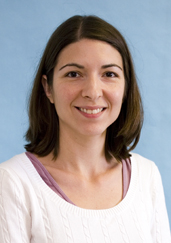Rita Tamayo, PhD

Contact Information6206 Marsico Hall, CB# 7290 Website Links |
Associate Professor Dept. of Microbiology and Immunology Division of Microbial Pathogenesis University of North Carolina at Chapel Hill Research SummaryRita Tamayo has a research focus to determine how Clostridium difficile colonizes the mammalian intestine, regulates the production of virulence factors, and transmits between hosts. Her focus is on the role of intracellular signaling molecules in regulating these processes. While investigating c-di-GMP regulation of flagellar genes in C. difficile, she discovered that flagellar genes are subject to phase variation in this pathogen. This mechanism involves the inversion of a DNA sequence 5’ of the early stage flagellar genes, which she termed the flagellar switch, via a site-specific DNA recombinase. The flagellar switch controls flagellar gene transcription, flagellum biosynthesis, and swimming motility. Importantly, because toxin gene expression is linked to transcription of flagellar genes via SigD, the flagellar switch also impacts the production of the TcdA and TcdB toxins. Her lab identified RecV as the recombinase that mediates inversion of the flagellar switch. Ongoing research aims to define the interaction between RecV and the flagellar switch region and determine the role of RecV-mediated phase variation in C. difficile pathogenesis. Further, the lab determined that gene regulation occurs through a post-transcription initiation mechanism (i.e. the regulatory module exists within the 5’ untranslated region of the mRNA). The molecular mechanism of flagellum and toxin phase variation via phase variation is an area of active study in the lab. Relevance of Research to CGIBD Mission: C difficile is an important and growing problem in the United States. Dr. Tamayo’s focus is directly relevant to the mission of the CGIBD to decrease the burden of digestive diseases. Dr. Tamayo’s trainees have participated in research and poster competitions. CGIBD Focus Area(s): Microbiome Pilot Feasibility Award 2010 Collaborators: Carroll, Sartor, Theriot
|